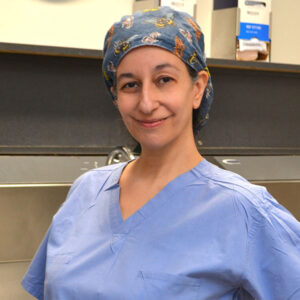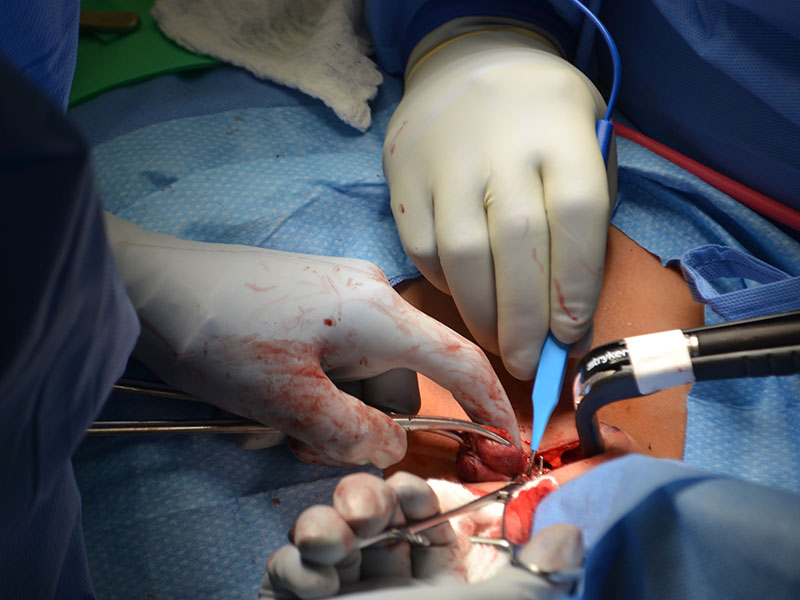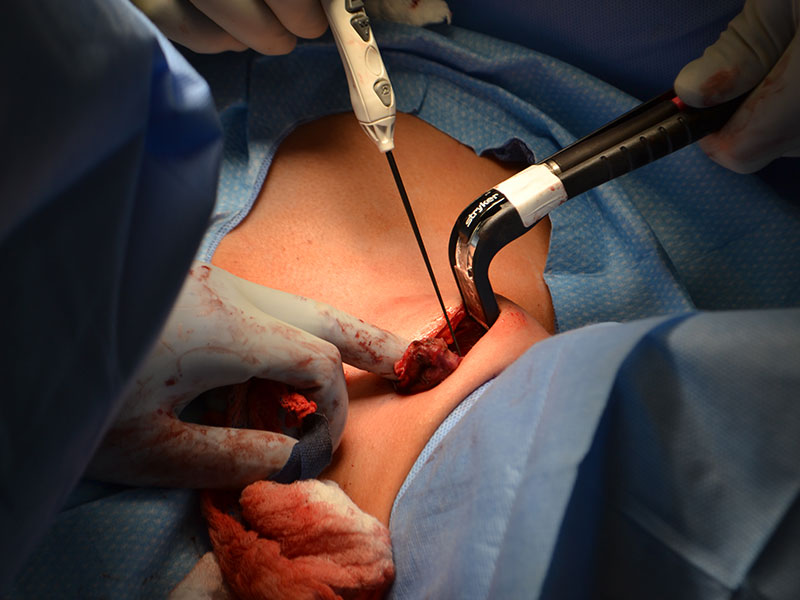UofL Health endocrine surgeon Mahsa Javid, MB, has multiple roles and enjoys all of them
LOUISVILLE For Mahsa Javid, MB, BChr, MA, DPhil, FRCS, FRCSC, delving into the causes of endocrine pathologies is a way to help her patients avoid surgery.
Javid, an academic endocrine surgeon at UofL Health, not only researches endocrine issues, but also teaches about them and performs the surgeries to treat them. Helping patients address issues earlier, and helping her students understand the disparities in healthcare can help save lives, she says.
Born in Iran, Javid’s family moved to England in the 1970s as the country fell into turmoil before the Iranian revolution in 1979. Javid’s father was a district attorney and economist and he and his wife decided to take the family where their children could get a good education, she says. Javid earned her undergraduate, medical, and master’s degrees from the University of Cambridge. In 2001, she moved to the University of Oxford to complete basic surgical training, higher specialist training, and general and emergency surgery fellowship training and to earn her doctorate in biomedical and clinical sciences.
In 2014, she moved to the United States to do a specialty fellowship in endocrine surgery at Yale University under the supervision of Robert Udelsman, MD.
Javid’s brother, Babak Javid, MD, also became a doctor and is a world leading infectious disease physician scientist at the University of California, in San Francisco.
“During the year of my fellowship, basically all I did was endocrine surgery,” she says. “I’m highly specialized. All we did week in, week out — 400 cases over the year — was just endocrine surgeries.”
A Triangular Career Path
Javid’s specialties include the management of benign and malignant endocrine disease,

complex cases including re-operative surgeries, conventional open and minimally invasive procedures for neck procedures, and posterior retroperitoneoscopic approach for adrenal disease.
Choosing endocrine surgery came from her desire to represent women in the field of surgery and her experiences with one of her mentors, Greg Sadler, MD, with whom she worked at the University of Oxford.
“I went into surgery itself because I felt that there was an under-representation of women in the field,” she says. “Then as I was doing all that training, I worked under Dr. Sadler who is probably one of the best surgeons I’ve ever had the privilege of being affiliated with, and he was an endocrine surgeon. As I was working with him, I began to understand the complexity of what he does and the intricacy of the surgeries, as well as all the medicine and physiology that go along with endocrine surgery. That’s why I chose endocrine surgery.”
It was her work with Sadler and her doctoral supervisor, Rajesh Thakker, MD, that also made her want to teach.
“They really taught me how to diagnose, how to think, how to do proper research, how to present properly at the top level, and that’s something that really motivates me to pass on as well,” she says. “Amongst all this surgery, I’m also an educator, and I take that job very seriously. There are students, undergrad and post grad; there are trainees, residents, fellows, all of whom come through our department, and I feel it’s an honor to take on all that responsibility of training the future generations.”
As a researcher, Javid is currently looking at thyroid cancer and how metabolites accumulate in the body and potentially contribute to tumorigenesis, and what is the mechanism in them that contributes to thyroid cancer formation. When it came time to practice medicine, she felt Louisville was the right place to focus on her endocrine specialty.
“There are only a few jobs a year that are advertised if you want to stay academic in endocrine surgery and want to pursue meaningful research,” she says. “There was an opening at UofL Health, and I felt it was a field that the institution was interested in focusing on, and it gave me the opportunity to really grow a program.”
Patients, Students, and Labs
Naturally, her weeks are busy ones. Javid says she typically has one or two days of surgeries and a full clinic day to see referred patients. On days when she is not with patients, she’s doing translational and clinical research and meeting with students and trainees to help them with their research.
The types of diseases she deals with center around multiple areas: the thyroid, parathyroid and adrenal, and other neuroendocrine tumors in the abdomen. That means the patient group also varies widely, she says.
“The age group is all encompassing. I see all ages, including pediatrics and patients into their late 80s and 90s who are fit and well enough,
but their condition requires my help. My patients are predominantly women. I tend to get a lot of patients from the Black population. And I’m also seeing a lot of immigrants. So, I really do see a wide variety of race, socio-economic status, job status, insurance status — I tend to see more of the underserved population than most other specialties.”
Research into the causes or contributing factors for endocrine pathologies in underserved communities and whether factors like the environment, social, economic status, access to healthcare, and race, contribute to endocrine pathologies ending up requiring surgery, is one of her ongoing interests, she says.
“It’s irrefutable that there are disparities in healthcare, and the short-sighted manner in which those disparities are dealt with actually leads to inefficiencies for everybody,” Javid says. “In the end it negatively impacts the entire healthcare system.”
Early Detection through Community Outreach
One thing Javid sees frequently is patient delays dealing with their presentations, which leads to a later diagnosis and more complications. Typically, by the time patients see her, their delays mean they are more likely to need surgery.
“There’s a lot of fear and apprehension, especially around needing surgery. So, what I’m trying to do is increase the visibility of my presence and willingness to see people,” Javid says.
To do that, she’s focused on opening a clinic in the West End of Louisville to have a presence where there is a high patient population. That presence, she believes, may help with other non-endocrine diseases as well.
“I think one way to improve the entire system is to be more available and to be where there are higher incidences of all types of related diseases that people may not think of, for example, hypertension or diabetes and obesity. All these things are connected to endocrine-related problems as well.”
Focusing on preventative measures, and helping underserved communities feel comfortable reaching out early with their concerns benefits more than just the patient, she says. “It really would make such a huge difference, and I think it would bring healthcare systems cost savings as well,” she says.
Delving into the links between what is going on with patients and how that creates endocrine-related pathologies is what she loves most though.
“The whole point about research is that we don’t know something, and we’re trying to know it, and that is the discovery aspect,” Javid says. “It’s innovative, and we’re trying to bring about positive changes. So, it’s something that can change the field. My priority will always be the patients who are under my care, but I think ultimately getting the research out is most exciting.”





